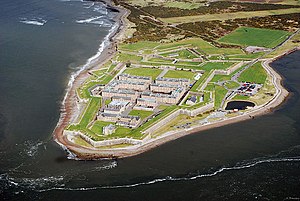Fort George, Scotland
| Fort George | |
|---|---|
| Dùn Deòrsa (Scottish Gaelic) | |
| Ardersier, Highland, Scotland | |

Fort George from the Air.
|
|
|
Location within Inverness-shire
|
|
| Coordinates | 57°35′02″N 4°04′13″W / 57.58389°N 4.07028°WCoordinates: 57°35′02″N 4°04′13″W / 57.58389°N 4.07028°W |
| Type | Georgian Star Fort |
| Height | Up to 12 metres (39 ft) |
| Site information | |
| Owner | Ministry of Defence |
| Operator |
|
| Site history | |
| Built | 1748-1757 |
| Built for | War Office |
| In use | 1757-Present |
| Materials | Sandstone |
| Events | Built after the Jacobite rising |
| Garrison information | |
| Occupants | The Black Watch, 3rd Battalion The Royal Regiment of Scotland |
Fort George (Gaelic: Dùn Deòrsa or An Gearastan, the latter meaning literally "the garrison"), is a large 18th-century fortress near Ardersier, to the north-east of Inverness in the Highland council area of Scotland. It was built to pacify the Scottish Highlands in the aftermath of the Jacobite rising of 1745, replacing a Fort George in Inverness constructed after the 1715 Jacobite rising to control the area. The current fortress has never been attacked and has remained in continuous use as a garrison.
The fortification is based on a star design; it remains virtually unaltered and nowadays is open to visitors with exhibits and facsimiles showing the fort's use at different periods, while still serving as army barracks.
The first Fort George was built in 1727 in Inverness; it was a large fortress capable of housing 400 troops on a hill beside the River Ness, on the site of (and incorporating portions of) the medieval castle which had been rebuilt as a citadel by Oliver Cromwell but later abandoned. The first commanding officer of the original Fort George was Sir Robert Munro, 6th Baronet, Colonel of the 42nd Royal Highlanders (Black Watch) and chief of the Highland Clan Munro.
During the 1745 rising the fort was seized by the Jacobites, who had it blown up in 1746 to prevent the Hanoverians from using it as a base. In 1747 Colonel William Skinner, the King's Military Engineer for North Britain, let a contract to rebuild the fortress at a new location.
...
Wikipedia

